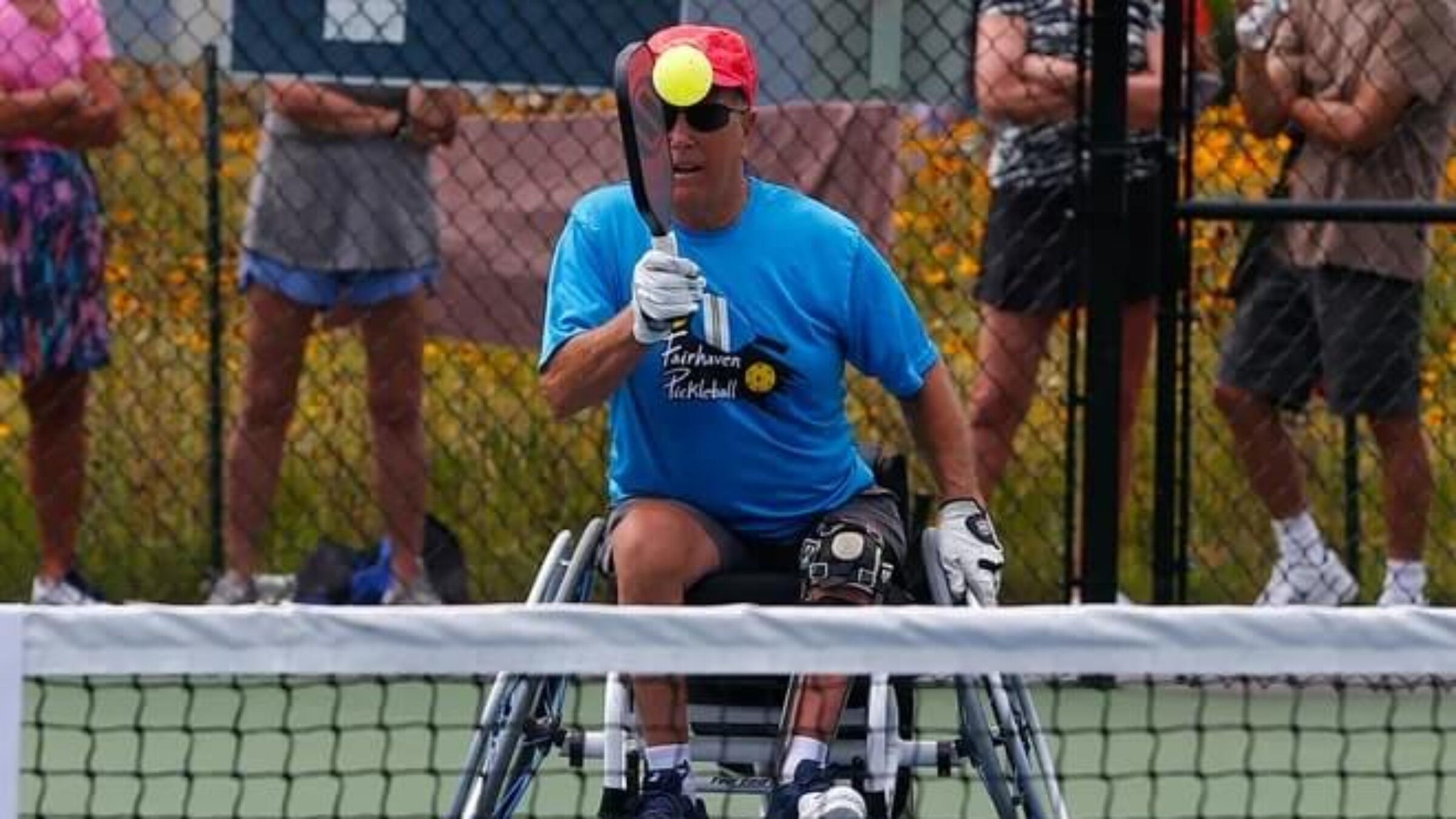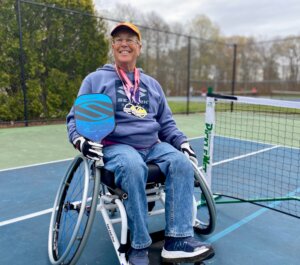The fastest growing sport in the US, pickleball is as accessible as it is fun
Pickleball champion Michael Lipp, 70, took to the sport ‘like a fish takes to water’

At this year’s U.S. Open Pickleball Championship, Lipp took home a silver in the hybrid doubles category . Courtesy of Michael Lipp
Growing up, Michael Lipp and his father had a tradition on the second day of Rosh Hashanah. After services at Congregation Agudath Achim in Taunton, Massachusetts, where the elder Lipp was a part-time cantor, they’d play golf at a nearby country club, whose links were largely empty because most of its members were Jewish.
Lipp had polio as a toddler, and used crutches or wore braces throughout his childhood, but his dad, Stanley, did not let his disability stop him from playing sports.
Now, at 70, Michael Lipp is among the top-ranked wheelchair pickleball players in the country. He recently competed at a national tournament in Naples, Florida, and serves as a brand ambassador — getting free paddles and gear to use in public — for Selkirk, a popular pickleball brand.
Lipp shows “all of us that there are truly no limits when you put your mind to conquering challenges,” said a Selkirk spokesperson, Hilary Williams.
Pickleball is the fastest-growing sport in the U.S., according to the Sports and Fitness Industry Association, with an estimated 36 million players. It was founded by some supposedly bored men on Bainbridge Island, Washington, in 1965, based partly on badminton. (Though the name apparently came from the “pickle” boats used in crew.)
For those who have been living under a rock, pickleball is a bit like tennis, but played on a smaller court, so it requires less running, therefore appealing to kids, seniors and those who otherwise would be considered non-athletes. Wheelchair players — I was unable to find an estimate of how many there are — are allowed an extra bounce of the ball.
I play pickleball at least twice a week in Oakland, California, where I live. I heard about Lipp through his wife, Wendy Garf-Lipp, a teacher I met through our intersecting interests of Judaism and the Grateful Dead (which is a whole other story).

Lipp, a retired teacher of early childhood education, lives in Massachusetts. He grew up in New Bedford, Massachusetts, the grandson of Sigmund Lipp, a Holocaust survivor who served as cantor of a Conservative synagogue in New Bedford, and, on his mother’s side, Greek Jewish immigrants from the tight-knit community of Ioannina.
He said that Camp Ramah in Palmer, Massachusetts, was “where I really became Jewish.” He met his wife, a former teacher at Solomon Schechter day schools, through a Ramah friend.
As a boy, Lipp pitched Little League games but had another player run the bases when he was at bat. He and his father played a lot of table tennis, which helped develop his hand-eye coordination and probably paved the way for his pickleball prowess. And he swam, improving his upper body strength.
When Lipp retired in 2016, he took up open water swimming and gardening.
A chance meeting in 2017 between his wife and a wheelchair tennis player gave him the idea to try tennis.
He had never tried a sports wheelchair before — or any wheelchair, for that matter. Sports wheelchairs have specially angled wheels and a bar in back to prevent users from falling out, and can move faster than regular wheelchairs. Mastering it had its own learning curve.
In 2018, Lipp said, his tennis mentor suggested he try pickleball.
“All I know is I took to it like a fish takes to water,” he told me.
Because the court is smaller, the balls he couldn’t return on the tennis court were now within reach.
“I thought, ‘This is too good to be true and I’m good at it, on top of it,’” he said.
He plays regularly at three different indoor clubs near his home, and outside in the summer. He attended his first tournament, the U.S. Open Pickleball Championships in Florida, in 2019. He didn’t medal, but it gave him the taste for more.
In 2022, Lipp won two silver medals, in wheelchair doubles and singles. In 2023, he picked up three more, a gold in wheelchair singles and a silver in doubles and hybrid. And this year, at the recent tournament, he took a silver in the hybrid doubles category.
He played one match on center court; it was broadcast on YouTube, and he had the thrill of knowing that nearly everyone he knew was watching him play.
“I’m around happy, healthy people all the time, and we’re not talking politics,” he said to explain how pickleball has improved his life. “Everyone roots for each other, and it’s just a great environment to be in every day.”
During the summer, he said, he rushes to the courts by 8 a.m. most mornings to beat the heat.
“I’m motivated to get out of the house and get really good exercise and have fun,” Lipp said. “Where would you rather be? On a treadmill or lifting weights at the gym, or on a court with people laughing?”
A message from our Publisher & CEO Rachel Fishman Feddersen

I hope you appreciated this article. Before you go, I’d like to ask you to please support the Forward’s award-winning, nonprofit journalism so that we can be prepared for whatever news 2025 brings.
At a time when other newsrooms are closing or cutting back, the Forward has removed its paywall and invested additional resources to report on the ground from Israel and around the U.S. on the impact of the war, rising antisemitism and polarized discourse.
Readers like you make it all possible. Support our work by becoming a Forward Member and connect with our journalism and your community.
— Rachel Fishman Feddersen, Publisher and CEO






























